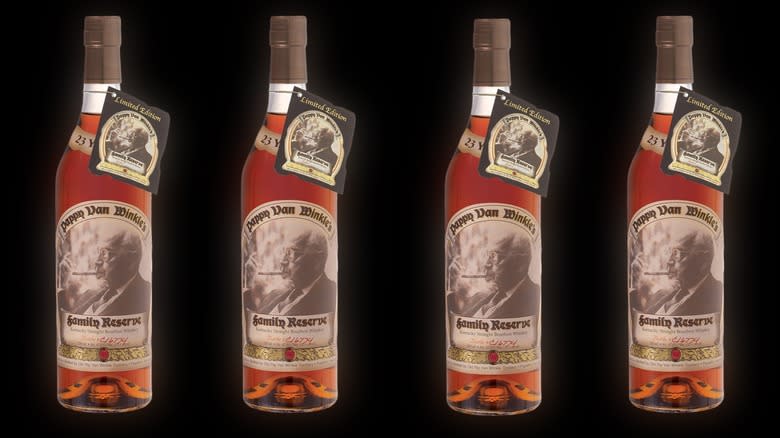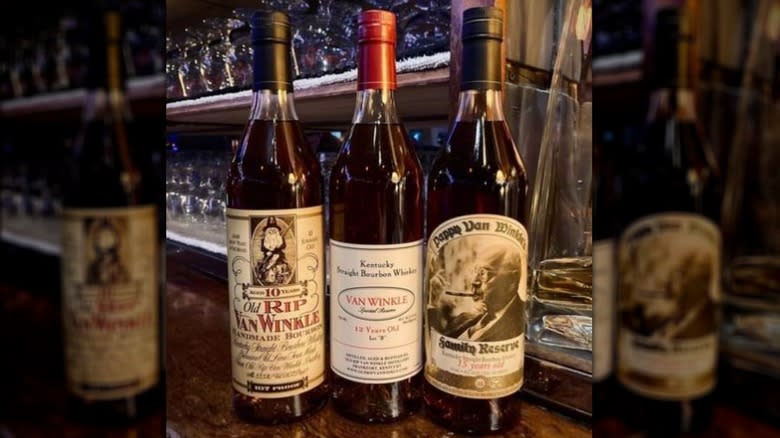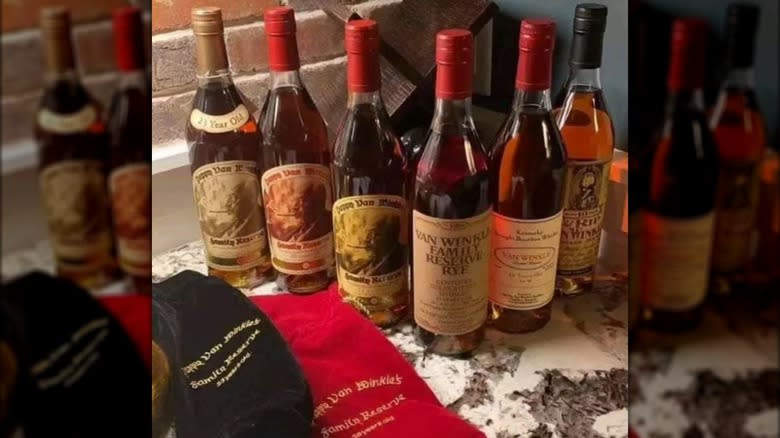How Social Media Played A Major Role In Pappy Van Winkle's Success

Pappy Van Winkle was a real guy, and if he could see the way modern fans swoon for his namesake bourbon, he'd probably need a swig of the stuff himself to calm down. Despite not having an official Instagram account of its own, Pappy Van Winkle has emerged as something of a social media superstar. Bourbon at large has the craft cocktail boom and the rise of foodie culture to thank -- but the contemporary dominance of Pappy brand bourbon owes its enduring dominion to the surge of social media in the 2010s.
Platforms like Instagram and Facebook are places for rare bourbon enthusiasts to connect and nerd out, and trading bottles seems like a natural progression of that connection. Pappy's consistently high demand and consistent scarcity also make it easy for folks looking to sell a bottle to do so, thereby self-perpetuating Pappy-mania. Anthony Bourdain was also a huge fan and took to social media to declare his Pappy passion. In 2011, the late great chef-slash-writer tweeted on X, formerly known as Twitter, that he was "considering a full back Pappy Van Winkle tattoo." And in a 2012 episode of "The Layover," he raved, "If God made Bourbon, this is what he'd make" (via Wine Enthusiast). Nothing like a familiar face to draw attention and breathe new life into a classic brand. Pappy fandom dominance even inspired Costco to start selling the rare bottles last December. Still, social media's sweaty, passionate love affair with Pappy has a dark side.
Read more: The 27 Best Bourbon Brands, Ranked
Fans Can Obtain A Rare Bottle More Easily...

Why is the Kentucky bourbon so rare in the first place? Pappy Van Winkle is distilled by Buffalo Trace, which releases only a small quantity of bottles per year. It's also aged from 10 to 23 years, which means the brand doesn't ebb and flow to meet consumer demand. It's a process that demands decades, and if fans want a bottle, they're just going to have to wait. It's one of the hardest-to-get bourbons in the world. In December 2022, a single bottle of Pappy 23 sold for $52,000 at a Sotheby's auction.
Enter social media, which has made it easier than ever for fans to get their hands on the rare bottles. Vendors can post Pappy pictures and sell their bottles, facilitating the Pappy trade and increasing accessibility exponentially. Notably, selling liquor online without proper authorization is illegal regardless of whether the Pappy is legit or not, but an Instagram DM makes it so easy. On June 13, 2019, Facebook shut down a private group of 55,000 members called "BSM." The cryptic moniker was short for "Bourbon Secondary Market," and the group was a dedicated unofficial marketplace for fans and collectors to resell rare bottles of bourbon. It isn't just private social media users, either. Some brick-and-mortar liquor stores have business Facebook or Instagram accounts where they post photos of their most coveted bottles to attract customers. That does fall within the confines of the law.
...but They Aren't Always Legit

Social media brings people together -- which means more opportunities to get your hands on a bottle of Pappy and more opportunities to get swindled by a counterfeit. The Van Winkle family and Buffalo Trace shelled out a whopping $500,000 from 2016 to 2017 to stop social media scammers, but the epidemic remains very much alive and well. Last December, customers allege they were scammed by a site called Whiskey Shack, which posted a Facebook ad listing $20 bottles of Pappy to Kentucky and Southern Indiana residents just in time for the holiday season. And -- surprise! -- it was too good to be true. The scam included legit-looking links to rare bottles of Pappy and provided buyers with real tracking numbers; the packages just never arrived.
The social media whiskey black market is also guilty of over-hyping specific brands, namely Pappy, which allows secondary pricing to run higher and higher, and folks are still willing to shell out money. A single bottle of Pappy sold secondhand online commonly fetches $1,000 minimum. The Wild West aspect of the unofficial online marketplace means vendor markups remain unchecked, which negates the accessibility appeal of selling booze via Facebook in the first place.
Read the original article on Tasting Table.

